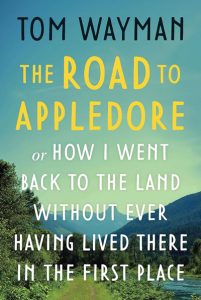Tom Wayman’s The Road to Appledore is a gentle narrative about how the author came to be the steward of a rural property near Winlaw, BC. The memoir of property, work, nature, home and self opens with Wayman and his partner, Bea, travelling from Vancouver to the Kootenays with his possessions crammed into a moving truck that has no reverse: a perfectly symbolic vehicle for Wayman crossing his own personal Rubicon. His move alone to a nearly nine-acre property is prompted, in part, by his desire to reassess his relationship that has become “comfortable, but not satisfying,” as described by their marriage counsellor.
However, this is not a maudlin, introspective book. Indeed, the reader may be left with a desire for more personal revelations, but that is not the book’s central aim. Instead, it is outward-looking and focuses on the labour of making and maintaining a home, that Sisyphean task. Appledore—the name Wayman gives his property, after a poem by A.A. Milne—becomes a home through labour, and the labour itself becomes a kind of home.
The second part of the memoir is divided into chapters named after seasons and elements. Wayman captures the personality of Appledore in its different seasonal expressions in prose and, on occasion, poetry. At times the details become overwhelmingly specific: the gravity-fed water system and its parts and problems, for instance, are described in minute detail. But the gentle humour of Wayman is present throughout, as he encounters roaming bears, amusing characters, even a talkative cloud (the cloud heard with pharmaceutical assistance).
Although the book is not explicitly a personal memoir, the character of Wayman is revealed slowly, piece by piece, through passing references to, for example, his teaching, his anti-war work and his union activities. The careful and sensitive eye of the author—as he describes the animals, trees and gardens of Appledore—reveals a studious and keen observer. At times, he also brings his observational powers to bear on larger topics: “Or maybe,” he astutely notes, “lack of curiosity is a by-product of how our society generally doesn’t encourage us to pay attention to where things come from: to learn about the working lives of those who feed, clothe, house us and more.”
The book, though, does exactly that: it encourages us to pay attention to how things such as water, food and community come to us. He does so unassumingly, with well-crafted, precise writing, good humour and an obvious deep affection for the land. This is a meditative reflection on home that captures well both the joys and the struggles of rural life, and we come to understand the labour of home is ultimately a labour of love.
Jay Gamble teaches English at the University of Lethbridge.
_______________________________________


